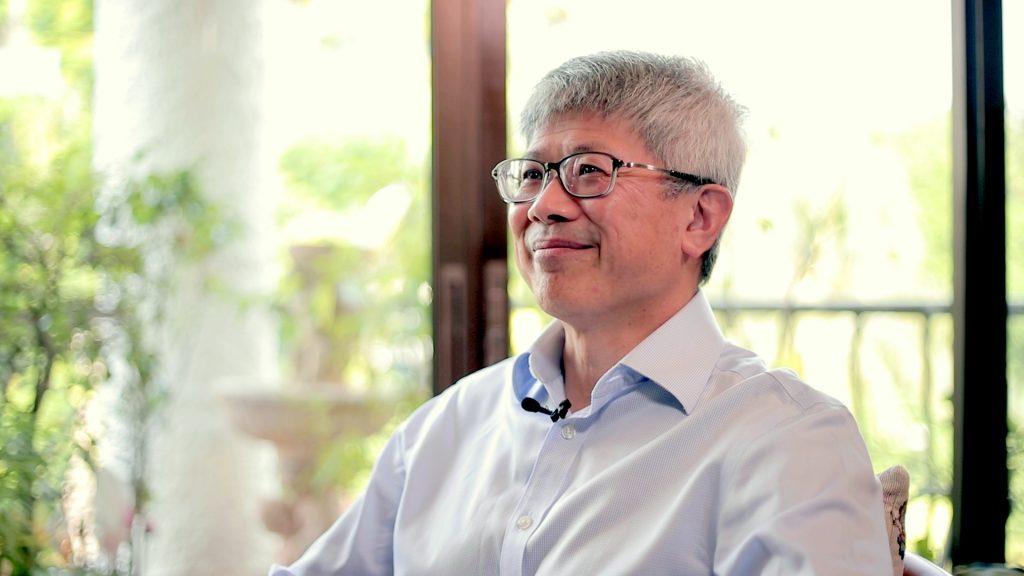
He may have a PhD in biochemistry, but Dato Kim Tan uses visceral language when he talks about his work and faith.
He talks about going on the ground to slums so you can smell the poverty. He talks about weeping for the marginalised because they must make God weep. And he talks about some of us needing a kick in the backside so we can stop rotting in our pews.
“There comes a point when prayer is no substitute for obedience,” the biotech entrepreneur says.
“You can go on praying and praying but the Bible says what? Go and do. It’s not go and believe some more. It’s not go and pray some more. It’s not go and sing some more. It’s go and do … so I think we need to say to everybody: Our faith needs to be practical.”
This desire to “do” inspired him and his family to link up with a charity while they were on holiday in South Africa many years ago.
Disillusioned into action
“We went into the slums for half a day with a very large NGO, and I just became disillusioned. I saw that these were really good-hearted people, well-meaning, good intentions, but they were helping people to make clothes by hand, furniture by hand, shoes by hand, arts and craft by hand. The quality was poor, they couldn’t do the quantities either.
“So that was really the beginning of the journey, to realise that I could give more money to this charity, but frankly it wasn’t going to change that slum.”
Instead of letting that disillusionment paralyse him, however, the seasoned entrepreneur and investor decided to use his business skills for social impact and co-founded the Transformational Business Network (TBN).
“TBN is a network of disillusioned philanthropists who are just tired of writing cheques to charities and not seeing any real change happening,” Tan explains.
“While there will always be a place for charity and for aid, such as in humanitarian crises, for long-term transforming and developing a nation, or transforming even a community, we need enterprise.”
Investors usually look for political and economic stability but these conditions are not often available in the very countries and communities that need their investment.
Hands-on risks
“It takes a different breed of investors who are willing to take the risk and who are willing to say: I can make my money elsewhere, but here, if I can make these kinds of investments, I might end up with a more sustainable business that gives me a small financial return, but a huge social return.”
Tan, who is also founding chairman of a fund management company focusing on biotech and social venture investments, says TBN takes a hands-on approach.
“To really understand poverty, you need to smell the poverty. Then you understand.”
“We have a phrase within TBN: To really understand poverty, you need to smell the poverty. You can’t read about it, you can’t watch it on television; you’ve got to be on the ground. When you smell the poverty, then you understand.”
Business people, he believes, are creative, good problem-solvers, and know how to help businesses grow. The growing businesses will need to hire more people, giving them the dignity of useful work and offering them the opportunity to send their children to school.
“So that’s the sort of thinking behind TBN’s movement. On my own, I just didn’t have a voice. But I thought if we could build a network with a movement, then we could start to have a voice to persuade governments to not just use the aid instrument alone to tackle poverty, but instead to bring the private sector, to bring enterprises in, to help transform.”
Not just money
“We spend a lot of time with the entrepreneurs in the early stages,” he says. “The sweet spot for us is somebody who already has an existing business – maybe employing three or five people in the slums – and we will come alongside, put a more robust business plan in place, put some management mentoring and management capacity in there.
“We will sit on the board, we will agree with them better strategies for their marketing or whatever, and then we’ll put in patient capital and journey with them until they can grow to employ 50 people, 100 people, 200 people.
“That’s the kind of TBN ecosystem that we have, to assist with these kinds of really tough businesses, trying to tackle these tough issues to grow,” he says.
“Because if they don’t grow, they’re always going to be struggling. And most businesses, if they’re not of a sufficient size, are just struggling all the time, living from hand to mouth, so we’ve got to put enough capital to help them get to scale.
“We have to agree with the entrepreneur at the very beginning what it is we want to measure on the social impact side. You want to measure things that are meaningful.
“So for us, measuring how many children start to go to school is very meaningful. How many parents that we employ start to save to send their children to tertiary education? That’s very meaningful, because if every family has one graduate from tertiary education, it transforms the economics in one generation.”
“You realise that you’ve been blessed and it’s your responsibility to give other people the same kind of opportunity that you’ve had.”
And Tan understands both poverty and the transformation first-hand.
He grew up poor in rural Malaysia. His parents, who immigrated from China with almost nothing, built a small provision shop business and sacrificed for him and his nine siblings to get a good education – many of them in the UK, where Tan now lives.
“When you grow up poor in a rural setting, and you’ve lived in a corrugated hut – so when it rains you can’t hear yourself speak – you can do two things when you become successful financially: One is, you just forget your past and just live extravagantly. Or two, you realise that you’ve been blessed and it’s your responsibility to give other people the same kind of opportunity that you’ve had.”
Weeping with God
“The other motivating factor has come from my Christian faith,” says Tan who, being “a bit of a rebel” himself, was drawn to the person of Jesus partly because he was an anti-establishment figure who “called out all the hypocrisy of the establishment”.
“The other attraction really was the whole message about social justice … the whole tenor of the gospel, of the Bible message, of a God who’s compassionate towards the poor. To me, that was very motivating and I guess therefore as a follower of Jesus, that’s all I’m seeking to do: To follow in His footsteps and be an instrument, to tackle the injustice that comes out of poverty.
“It’s got to make God weep,” says Tan, when He sees people who are trafficked, or the horrible environments of children who live in slums, can’t go to school and don’t have food, or communities destroyed because of preventable disease.
“And therefore it should make us weep too, as His people. And we need to understand that we have a responsibility.
“We need to give a kick up the backsides to all our business people sitting in our pews – and often rotting in our pews – who feel that they’re there without any kind of gifts and they’re just walking mobile ATMs, so they can be released and go out and use the business talents and resources that they have to help local businesses grow.”
Bracing for discouragement
But Tan also offers a dose of reality for those who may think good intentions and effort will always yield good returns.
“You know the biggest discouragement is always when people let you down. And so when you invest time in the individual and you have high hopes for them, and suddenly they go and do something silly, or suddenly come to work drunk, or suddenly they’re caught stealing – and these are all everyday challenges that we face in the kinds of businesses that we run – that’s always the biggest disappointment.
“But then we realise: We all fail. And you have to decide whether you give up or whether you persevere and say: ‘We might have failed this one, or this one has failed, but let’s try the next one, let’s try the next one after that.’
“Eventually you will be successful. Because there will be people who’ll want you to come alongside them and partner with them to lift themselves out of poverty, so perseverance is pretty important. You’re going to meet lots of disappointment; people will just let you down. You’ve just got to persevere.”
He also warns against using impact investing or doing good as a substitute for intimacy with God.
“If you don’t have intimacy with God, you will not be able to do this kind of work. It will break you. It will disillusion you. And you will give up.
“So for us it’s really, really important to have deep roots in the Word, in the Scriptures.”
How to get involved
If you’re an entrepreneur creating social impact in Africa and Asia, and looking for funding and equipping, TBN wants to hear from you.
If you want to get involved in social impact investing – whether as an investor big or small, or in offering your time and skills – TBN wants to hear from you as well.
https://www.tbnetwork.org/forms/contact-us or https://www.facebook.com/tbnetworksasia/
In Dato Dr Kim Tan’s own words https://www.youtube.com/watch?v=LZ00o-zaJUE
We are an independent, non-profit organisation that relies on the generosity of our readers, such as yourself, to continue serving the kingdom. Every dollar donated goes directly back into our editorial coverage.
Would you consider partnering with us in our kingdom work by supporting us financially, either as a one-off donation, or a recurring pledge?
Support Salt&Light


